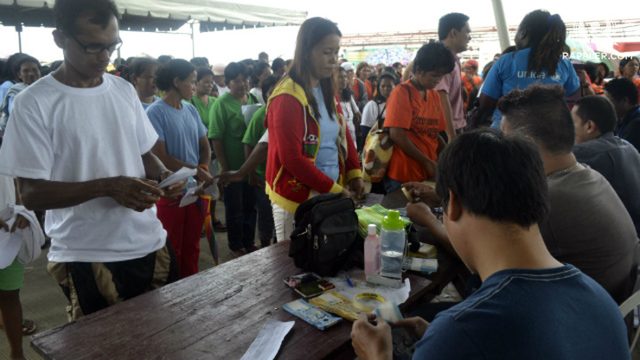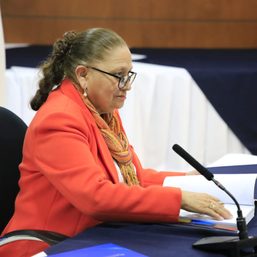SUMMARY
This is AI generated summarization, which may have errors. For context, always refer to the full article.

MANILA, Philippines – A new Social Weather Stations (SWS) survey showed that 80% of Filipino voters will likely vote for candidates who will continue the Aquino administration’s flagship poverty alleviation program, the Conditional Cash Transfer (CCT) program or 4Ps (Pantawid Pamilyang Pilipino Program).
The survey, conducted from February 5 to 7 among 1,200 respondents, showed that the continuation of the 4Ps program and the implementation of the controversial Reproductive Health (RH) law are the most supported advocacies of Filipino voters.
The survey results showed that 80% of the respondents said they would “probably vote” for a candidate who would continue the CCT program, which provides poor families with cash grants, livelihood programs, and scholarship opportunities.
Based on the poll, 9% of respondents said they would “probably not” vote for candidates backing 4Ps, while 12% said they will not be affected.
This continued the trend from past surveys in January 2016 and September 2015, where 80% of respondents also said they would elect candidates who would continue the CCT program. (READ: 4Ps, agriculture are popular election issues – survey)
The continuation of the social protection program is a campaign promise of politicians running for the presidency in 2016. The administration’s bet, Manuel Roxas II, earlier vowed to institutionalize the program and expand it to include barangays (villages). Other candidates, like Vice President Jejomar Binay and Senator Grace Poe, said they would continue the CCT program, but will introduce reforms.
The Aquino administration has touted the achievements of the CCT program, but it has received its share of flak from critics who call it a dole-out program that does not really benefit the poorest of the poor.
Other advocacies: RH, FOI, Daang Matuwid
The February SWS survey also found that 3 other advocacies garnered the support of at least 60% of respondents: the full implementation of the RH law, the enactment of the Freedom of Information (FOI) law, and the continuation of Daang Matuwid, the tagline of the Aquino administration’s good governance platform.
Of the survey respondents, 66% said they would vote candidates who will ensure the full implementation of the RH law, the controversial measure which would provide universal access to reproductive health care services and information. It was signed into law in 2012, despite fierce opposition from the Catholic church and other religious groups.
SWS said 19% said they would probably not vote for candidates who would ensure the implementation of the RH law, while 16% said they will not be affected.
The 3rd most supported advocacy was the enactment into law of the FOI bill: 62% of respondents said they would vote for a candidate who will promise this, while 17% said they would probably not, and 21% said they will not be affected.
The February survey showed that support for candidates backing the FOI law rose from 60% in January 2016, and 48% in September 2015.
Meanwhile, 60% said they would probably vote for a candidate who will continue the Daang Matuwid principle of the Aquino administration. This was a 5-percentage point drop from the September 2015 and January 2016 surveys, where 65% said they would support candidates with this advocacy.
Eighteen percent of the respondents, meanwhile, said they would probably not vote for candidates with this advocacy, while 22% said they will not be affected.
Other issues
The SWS survey also tested public acceptance of voters backing 6 other advocacies.
- 59% would probably vote for candidates backing the re-imposition of death penalty for heinous crimes
- 47% would probably vote for candidates defending the rights of the Lesbians, Gays, Bisexual and Transgender community
- 47% would probably vote for candidates who will push for the enactment of the anti-political dynasty law
- 34% would probably vote for candidates who will push for the enactment of the divorce law
- 31% would probably vote for candidates backing the enactment of the Bangsamoro Basic Law
- 19% would probably vote for candidates backing the enactment of a law allowing the foreign ownership of lands
The number of respondents supporting candidates on the re-imposition of the death penalty for heinous crimes rose 10 percentage points, from 49% in January 2016 to 59% in February 2016. This is a mong the advocacies of Davao City Mayor Rodrigo Duterte.
Meanwhile, there was a 7-percentage point increase in the number of respondents supporting candidates who will push for the enactment of a divorce law, from 27% in January 2016 to 34% in February 2016. – Rappler.com
Add a comment
How does this make you feel?


![[WATCH] Try This: Empanada Salteña from Argentina](https://www.rappler.com/tachyon/2023/04/try-this-empanada-saltena-argentina.jpg?resize=257%2C257&crop=765px%2C0px%2C1037px%2C1037px)


There are no comments yet. Add your comment to start the conversation.